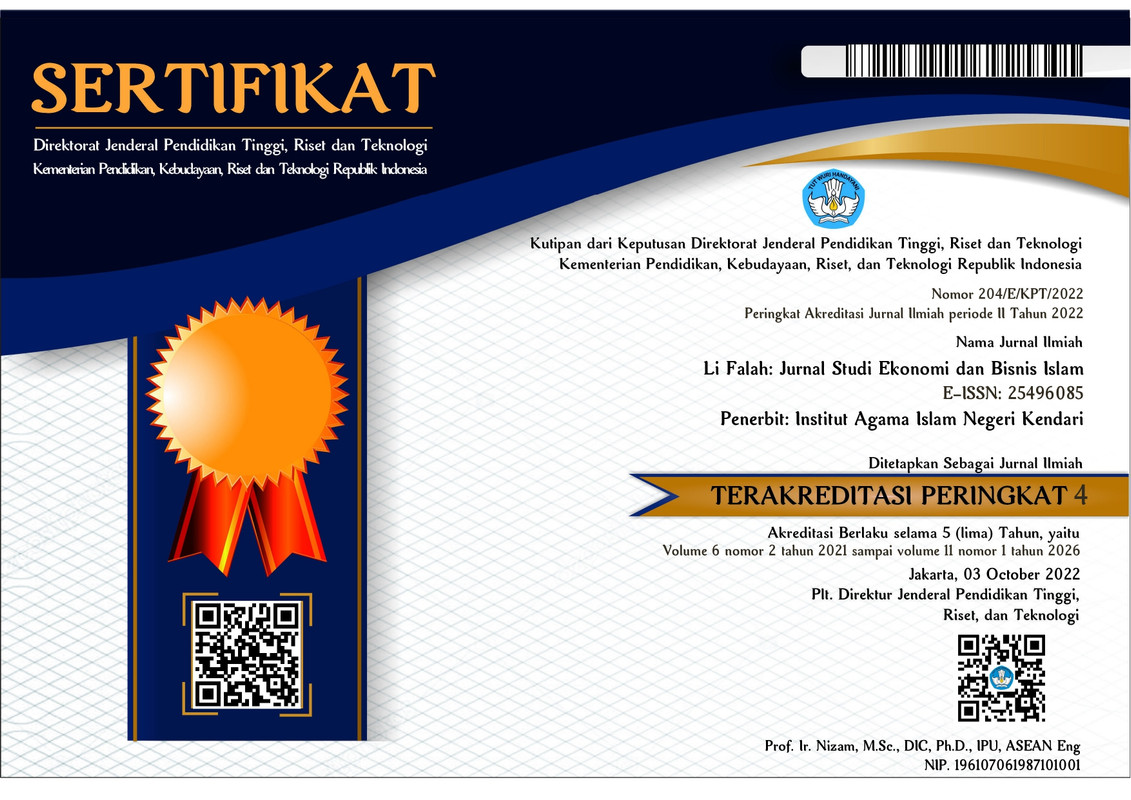The Concept Time Value of Money from the Point of View of Islamic and Conventional Finance
Abstract
The time value of money is the basic concept of elements and basic concepts of investment that are part of conventional financial theory. The value of everything now will be more significant in the future. This consideration system is not ruled out by Islamic finance because it covers the price of a commodity on every contract sale that must be paid in the future, and it is not forbidden to increase the price given. However, the time value of money in Islamic finance is different from conventional finance. In this discussion, describe the concepts of the time value of money from the point of view of Islamic and conventional finance, both theoretically and practically.
Keywords
Full Text:
PDFReferences
Abdel Karim, R. A. (1995). The Nature and Rationale of a Conceptual Framework for Financial Reporting by Islamic Banks. Accounting and Business Research, 25(100), 285–300. https://doi.org/10.1080/00014788.1995.9729916
Adnan, M., & Gaffikin, M. (1997). The Sharia, Islamic Banks and Accounting Concepts and Practices. Accounting, Commerce and Finance: The Islamic Perspective International Conference I.
Ahmad, A. U. F., & Kabir Hassan, M. (2006). The time value of money concept in Islamic finance. American Journal of Islamic Social Sciences, 23(1), 66–89.
Alam Choudhury, M., & Hussain, M. (2005). A paradigm of Islamic money and banking. International Journal of Social Economics, 32(3), 203–217. https://doi.org/10.1108/03068290510580760
Apriantoro, M. S., Rahayuningsih, I. N., & Sarwanto, S. (2022). Implementation of Green Economy Through Integrated Urban Farming as Family Economic Resilience During The Pandemic: Maqasid Sharia Perspective. IQTISHODUNA: Jurnal Ekonomi Islam, 11(1), 1. https://doi.org/10.54471/iqtishoduna.v11i1.1593
Baehaqi, A., Birton, M. N. A., & Hudaefi, F. A. (2020). Time value of money in Islamic accounting practice: a critical analysis from maqāṣid al-Sharī‘ah. Journal of Islamic Accounting and Business Research, 11(9), 2035–2052. https://doi.org/10.1108/JIABR-09-2018-0155
Baur, D., & Lagoarde-Segot, T. (2016). The Contradiction between the Time Value of Money and Sustainability (pp. 75–92). https://doi.org/10.1108/S2043-905920160000011004
Eyerci, C. (2022). The approach of Islamic economists to the prohibition of interest in the context of Böhm-Bawerk’s time preference theory of interest. International Journal of Islamic and Middle Eastern Finance and Management, 15(1), 18–31. https://doi.org/10.1108/IMEFM-05-2020-0202
Fadzlurrahman, F., & Abubakar, L. (2019). Pengalokasian risiko dalam pembiayaan proyek berbasis sukuk guna mewujudkan kemudahan berusaha. Jurnal Jurisprudence, 9(2), 133–148. https://doi.org/10.23917/jurisprudence.v9i2.8073
Faizah, I., Fasa, M. I., Suharto, S., Rahmanto, D. N. A., & Athief, F. H. N. (2019). Determinants of Domestic Direct Investment in Indonesia: Islamic Economic Approach. JEJAK, 12(2), 282–297. https://doi.org/10.15294/jejak.v12i2.20973
Farooq, M. O. (2019). Rent-seeking behaviour and ẓulm (injustice/exploitation) beyond ribā-interest equation. ISRA International Journal of Islamic Finance, 11(1), 110–123. https://doi.org/10.1108/IJIF-07-2018-0073
Hamidah, R., Alam, A., & Izzuddin, A. (2022). Comparison Analysis Of Murabahah And Mudharabah Financing Risk Financing From Sharia Micro-Finance Institutions. 5, 1–14. https://doi.org/10.26618/jei.v5i1.7521
Hayes, S., & Volkert, J. F. (1990). Time And Money: Time As An Accounting Concept. The Bottom Line, 3(4), 25–27. https://doi.org/10.1108/eb025256
Kahf, M. (1994). The Value of Money and Discounting in Islamic Perspective: Re-Visited. Review of Islamic Economics, 3(2), 31–38.
Khan, M. F. (1991). The value of money and discounting in Islamic perspective. Review of Islamic Economics, 1(2), 35–45.
Muda, I., & Hasibuan, A. N. (2018). Public Discovery of the Concept of Time Value ofMoney with Economic Value of Time (pp. 251–257). https://doi.org/10.1108/978-1-78756-793-1-00050
Muhammad, M. (2012). Rekonstruksi time value of money menuju economic value of time untuk keuangan islam. Islamic Review: Jurnal Riset Dan Kajian Keislaman, 1(2), 163–190.
Ott, A. C. (2011). Time‐value economics: competing for customer time and attention. Strategy & Leadership, 39(1), 24–31. https://doi.org/10.1108/10878571111095394
Prasetyo, Y. (2018). Jaminan Kepastian Hukum Dalam Pengembangan Transaksi Keuangan Syariah. Jurnal Jurisprudence, 7(2), 169–178. https://doi.org/10.23917/jurisprudence.v7i2.3651
Rosly, S. A. (2005). Critical Issues in Islamic Banking and Financial Markets. Critical Issues on Islamic Banking and Financial Markets.
Samuelson, P. A. (1958). An exact consumption-loan model of interest with or without the social contrivance of money. Journal of Political Economy, 66(6), 467–482.
Suharto, U. (2018). Riba and interest in Islamic finance: semantic and terminological ıssue. International Journal of Islamic and Middle Eastern Finance and Management, 11(1), 131–138. https://doi.org/10.1108/IMEFM-08-2016-0109
Tomkins, C., & Karim, R. A. A. (1987). The Shari’a and Its Implications For Financial Analysis: An Opportunity to Study Interactions between Society, Organisations and Society. The American Journal of Islamic Social Sciences, 4(1), 101–115.
DOI: http://dx.doi.org/10.31332/lifalah.v8i1.4108
Copyright (c) 2023 Muhamad Subhi Apriantoro, Rashifahunnisa' Mellinia

This work is licensed under a Creative Commons Attribution-ShareAlike 4.0 International License.
Li Falah : Jurnal Studi Ekonomi dan Bisnis Islam, Indexed In
Accredited By
View My Stats
Organized by : Fakultas Ekonomi dan Bisnis Islam
Published by : Institut Agama Islam Negeri Kendari
Jl. Sultan Qaimuddin No. 17 Baruga Kota Kendari Provinsi Sulawesi Tenggara
phone. +62401-3193710
Fax. +62401-3193710
Email: [email protected]



















